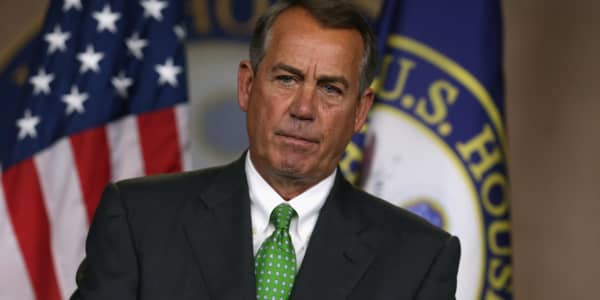This year's SXSW comes at a time when the startups that populate the festival face some very real challenges: Valuations are declining in many places, funding isn't as easy to come by, and the initial public offering market has dried up.
Still, the mood is bright at the annual gathering of entrepreneurs, investors, and media. A range of investors CNBC spoke to are plenty bullish on the potential investments they're scoping at back-to-back meetings, panels and parties.
State of tech: Still a bubble?
Revolution's Steve Case, who lived though a bubble in his time running AOL, said he's seeing a correction on valuations for pre-IPO companies. On the venture side, "investors are starting to get a little more sober, a little bit more cautious," he said.
But he's confident the best companies will still be able to raise money, and he's actually planning to accelerate his fund's pace of investment.
"From a deal-flow perspective, from an opportunity perspective, it's definitely not slowing down," said NEA partner Rick Yang, though he did acknowledge what he called a "reversion to the mean."
"Valuations have come down a bit…as a big (venture capitalist), I think it's both good and bad, because when we're looking at new opportunities it means we can get a little bit more ownership at a cheaper price. But on the flip side our portfolio companies are experiencing the same thing when they go out to fundraise," Yang said.
Josh Elman, partner at VC firm Greylock, sees plenty of reasons to be optimistic, pointing to GM's recent $1 billion acquisition in the self-driving car space. "So that leaves me more inspired ... We're still creating the future and some of it is going to be right."
In the meantime, Yang and other VCs are encouraging their portfolio companies to plan for "longer liquidity cycles" — meaning they need to get to sustainable profitability before pursuing fast growth.
And these leaner times can be a great force in creating stronger companies for the long run. "When companies are forced to live within their means...it helps them through the the lifecycle of the entire company," Yang said.
So what types of companies are these investors most interested in at SXSW?
Cashing in next-generation content
New types of content-sharing apps are generating a lot of buzz in Austin. But in a shift away from the photo-sharing craze epitomized by Instagram, now the focus is on audio sharing as well. Anchor calls itself an "audio social network" — think podcasting meets Twitter. Users can post short audio clips, share them, and respond to other people's clips, like Facebook or Twitter interactions but with voices.
"I think it has the potential to be as big as radio," said Anchor CEO Mike Mignano. "It's as easy as talking into a phone. It's a medium anyone can use."
Ease of use is also central to KnowMe, co-created by filmmaker JJ Abrams and Moviefone co-founder Andrew Jarecki. It allows users to easily create and share short video clips by narrating over a handful of photos. NEA's Yang said these types of startups are built on an an interest in "understanding how to build a community around content."
As for where the future of content is headed, Elman pointed to the range of virtual reality demos on display in the convention center, from Sony's PlayStation VR, to a startup called Splash, which allows users to turn 10 photos into a 360 video they can share with anyone. Samsung is hosting a house near the convention center in Austin to showcase its GearVR headset, allowing visitors to experience a Six Flags roller coaster.
Fintech grows up
SXSW hosted a number of panels on financial technology, and Monday morning one Austin-based FinTech startup — Honest Dollar — announced its acquisition by Goldman Sachs.
NEA's Yang said some of these startups have the potential to grow with millennial consumers. (NEA is invested in zero commission brokerage Robinhood.) Yang said he was focusing on companies that can "capture these consumers right at that very malleable demographic of just coming out of college, getting your first job, opening your first savings account."
"People stick with their financial services, traditionally, for a long time," he said.
Policy meets technology
This year, on the heels of President Barack Obama's speech about the need for technology to improve civic engagement, a merging of technology and policy is front and center. Case said policy is driving the conversation in everything from food to education to healthcare, and that's only going to accelerate.
"Over the last 10 to 15 years the government really hasn't been that important because it's really been more about the app economy. But it's getting important again because the sectors most ripe for disruption are regulated," Case said.
"There's going to be more of a role for government," Case added. "Entrepreneurs don't necessarily like to hear that because they get frustrated by the pace of change and how it's difficult sometimes to work with government. But the reality is the great innovations and the next wave are going to require more engagement with government, and more partnerships with other companies. It's not so much the go-it-alone mentality of the last decade."
Elman agreed. "A lot more conversations I've had this year are about the government," he said. "Blending technology and the government. I've heard that be even more of an important topic of where we need to go in the future than just 'what's the new hot app this year?'"
But tackling these bigger issues — healthcare, education, and energy — comes with bigger challenges. "It's a little harder to really revolutionize healthcare or learning than it is to create a photo app or a dating app," Case said. But the potential payoff is massive.
"It's really about everyday life and how do you use technology and the Internet to improve the things that are in some way the most important aspects of our lives," he said.






